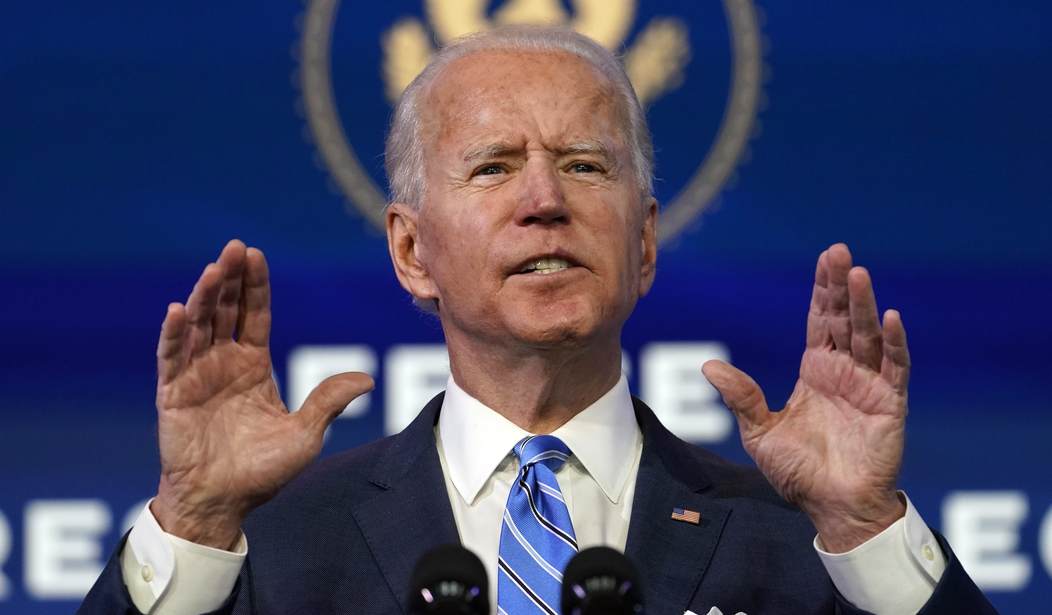None of President-elect Joe Biden’s cabinet picks have caused quite as much controversy as Neera Tanden, his nominee to head the Office of Management and Budget. As the head of The Center for American Progress, the leading progressive think-tank in Washington, Tanden’s not a stranger to Twitter feuds with political opponents. But when it comes to policy, her views should cause deficit hawks great pause.
In a piece she co-authored in March titled “Deficit and Debt Shouldn’t Factor Into Coronavirus Recession Response,” Tanden concluded, “Deficits and debt pose no comparable risk. Policymakers should set aside their concerns about red ink and deliver the response the crisis demands.”
Contrary to his own OMB pick, Biden does seem to be slightly more concerned about wasteful government spending. During the Obama administration, Biden was tasked with leading the “Campaign to Cut Waste,” which would “hunt down misspent tax dollars in every agency and department of this government.”
The campaign had some success, cutting $17.6 billion as a result of payment errors in programs like Medicare, Medicaid, Pell grants and food stamps. But there’s plenty more to cut, and as POTUS, Biden has an opportunity to fight waste and government overreach head-on by appointing a “Waste Czar” with a sole mission of reducing the deficit and national debt.
Far from posing “no risk,” the national debt and federal budget represent taxes on future generations that come in various forms like inflation or tax increases. And the figures are staggering. Since 2010, the national debt has increased from 53 percent of U.S. GDP to 79 percent of GDP at the end of fiscal year 2019. CBO projects the deficit reaching over $1.6 trillion by 2030, and the national debt reaching an all-time world record of $38 trillion by then.
Recommended
While reducing payment errors showed some progress, it was a drop in the bucket compared to the rest of the waste that exists in the federal budget. Biden’s Waste Czar could set their sights on two main areas: earmarks and corporate subsidies.
There’s been a resurgence of earmarks within federal spending bills. Despite a so-called “earmark moratorium,” Congress has set a record for the third year in a row on the cost of earmarks. In fiscal year 2020, the government allocated $15.9 billion to earmarks, a 3.9 percent increase from 2019. In 2020, two earmarks worth $39.3 million went to a program to “combat underwater pests” while another $25.8 million went to “wild horse and burro management.”
One area where the many on the left and right find common ground is in the reduction of corporate subsidies. A recent Rasmussen poll found that 70 percent of American voters “think government and big business often work together in ways that hurt” the rest of us. In a free market economy, the government shouldn’t be picking winners and losers, but a subsidy tracker from Good Jobs First shows the staggering amount of corporate subsidies going to the top firms across all types of industries in the U.S.
Two major areas of corporate subsidies include energy and agriculture. Repealing special tax breaks for oil and gas companies could save taxpayers $37.7 billion over 10 years. Meanwhile, about 39 percent of the nation’s 2.1 million farms receive agricultural subsidies that amount to over $20 billion a year. These subsidies, designed to protect U.S. farmers from foreign competition and lower-than-expected crop prices, don’t benefit consumers. Research by the Congressional Budget Office and Department of Agriculture conclude that there’s no correlation between subsidies for crops and food prices.
Another less-discussed area of corporate subsidies come in the form of tax extenders, which are often framed as “temporary” subsidies or tax breaks provided to a specific company or industry by Congress. According to Americans for Prosperity, these extenders include racehorse owners, brewers, distillers, vintners, motorsports race tracks, film, television, and theater. These extenders cost taxpayers millions each year. The Joint Committee on Taxation estimated that the handouts for brewers, distillers and vintners, set to expire this year, cost $4.2 billion just last year. But the industry is pushing for an extension of these subsidies.
The problem with these extenders is that they are generally not “temporary” at all. Many of them have been renewed over and over since the 1980s. A cynical take on these extenders is that they give members of Congress an opportunity every year or two to raise campaign cash from the industries that benefit from these extenders. But as the Heritage Foundation argues, they undermine equal and fair tax policy.
Biden’s Waste Czar may want to focus on the efficacy of entire government programs like the National Endowment for the Arts (NEA) or Humanities (NEH). A controversial book by Duke University History Professor Nancy MacLean received an NEH grant, despite the fact that it has been thoroughly debunked. Academics, authors, and artists should be free to study and write about what they want, but should taxpayers foot the bill, especially when it leads to shoddy research?
Peter Ferrara is a Senior Fellow at the National Tax Limitation Foundation. He served on the White House Office of Policy Development under President Reagan, as Associate Deputy Attorney General of the United States under President George H.W. Bush, and as the Dunn Liberty Fellow in Economics for the King’s College in New York.
























Join the conversation as a VIP Member